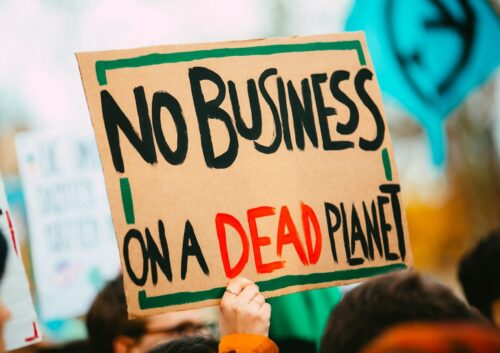
The Hill posted an opinion piece by William S. Becker titled, “Climate denial is tearing our nation apart — we can’t wait much longer to act,” in which Becker asserts climate change is leading to both worsening weather and worsening politics. Becker is wrong on both counts. [emphasis, links added]
Polling consistently shows that while most people believe climate change is happening, the number very worried about it hasn’t changed much over the past few decades, and very few people are willing to sacrifice much in an attempt to reduce future climate change; there is no evidence whatsoever climate “denial” threatens to rend the political fabric of the nation.
In addition, data clearly proves that Becker is simply wrong about worsening extreme weather.
“We know from decades of scientific research, and now from brutal experience, that global climate change is real,” writes William S. Becker, a former U.S. Department of Energy official who founded its Center of Excellence for Sustainable Development under then-President Bill Clinton.
“Few, if any, places in the U.S. are safe from its many consequences. They are as quick as flash floods and as slow as rising seas, but they are undeniably real and growing worse.”
“One result is personal and society-wide cognitive dissonance — the mental and emotional discomfort we feel when our actions clash with reality or beliefs.
“A recent Gallup poll shows that 63 percent of Americans believe global warming is underway, and that 48 percent — a record — believe it will seriously threaten their way of life,” Becker continues. “Yet more Americans are moving into places with high risks of climate-related disasters rather than out of them.”
Becker is wrong; there is no cognitive dissonance in people’s positions, but rather it reflects a rational assessment of the relative importance of climate change as a threat to their lives and well-being when compared to other issues, like the economy, jobs, health care, education, crime, and illegal immigration.
Polls cited in Climate Realism here, here, and here, for example, and at Climate Change Weekly here, here, and here, consistently show that although a plurality of people believe climate change is occurring and are worried about it to some degree, it ranks last or near last in their list of concerns, and they are unwilling to pay much to prevent or mitigate it.
The same polls also show that the vast majority of those concerned about climate change are not willing to change their lifestyles very much, such as by reducing travel, buying electric vehicles, or giving up meat, to fight climate change.
Despite 25 years of mainstream media constantly warning of climate doom, the public is largely unmoved.
Indeed, as recently as early July, CNN’s senior data journalist Harry Enten reported on a new Gallup poll on climate change and natural disasters that found the percentage of Americans “greatly worried” about climate change had declined by six percentage points since 2020, down to just 40 percent.
That’s the same percentage of people surveyed who expressed worry about climate change in Gallup’s 2000 survey when asked the same question.
Meaning that despite 25 years of mainstream media constantly warning of climate doom, the public is largely unmoved.
This would seem to suggest that the majority of people understand that, to the extent climate change threatens harm, the threat it poses is distant, and would have far less impact on their lives and neighborhoods than ensuring low crime, high-quality health care, and continued economic growth.
They also seem to instinctively understand that fossil fuels are the foundation for the modern society they take for granted. That’s not evidence of cognitive dissonance; that’s hard-headed resistance to propaganda.
In short, polls don’t show that climate denial,[however Becker defines it, is tearing America apart; [he provides no evidence, direct or indirect, to support this claim, just pseudo-psychobabble about the public’s struggle with cognitive dissonance].
In case you are wondering, Beker is neither a psychologist nor a psychiatrist.
What about the instances of extreme weather and rising seas that Becker claims climate change is making worse or more severe?
To start, for a broad range of extreme weather, even the U.N. Intergovernmental Panel on Climate Change (IPCC) admits having low confidence that trends have changed or gotten worse for most classes of extreme weather events.
The IPCC also does not forecast any such signal to arise by 2050 or 2100, either. Data provides no support for claims that during the recent period of modest warming, floods, hurricanes, wildfires, tornadoes, or drought have become more frequent or severe, despite what misleading headlines and unresearched stories in the mainstream media might lead one to believe.
Globally, sea level rise is not uniform, and the best evidence from tide gauges and historical analyses suggests that the present rate of warming is not unusually rapid [compared to historical periods].
In the end, much of Becker’s career has been founded on promoting climate alarm to push an energy transition. His reputation depends on people accepting him as an expert and taking his views on the matter as authoritative.
His book sales and funding for the various organizations he is associated with depend on no one derailing the climate change gravy train. While Becker has a right to his opinion, and The Hill has a right to publish it, neither has facts on their side.
Truth will out! And solid science, such as is contained in the Climate Change Reconsidered series of reports and the recent U.S. Department of Energy report assessing the impacts of greenhouse gas emissions on U.S. climate, demonstrates that climate change, while undoubtedly real, poses no credible threat to human life or well-being.
Real-world data also show that the fossil fuels Becker rails against in his Hill op-ed remain fundamental to growing economic prosperity and ongoing improvements in human health and longer lives.
Read more at Climate Realism



















Global Warming/Climate Change is one the biggest scams in World History no one can afford the costs of Going Green